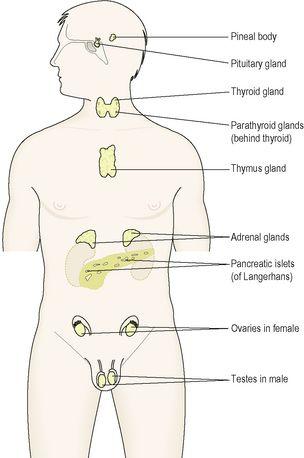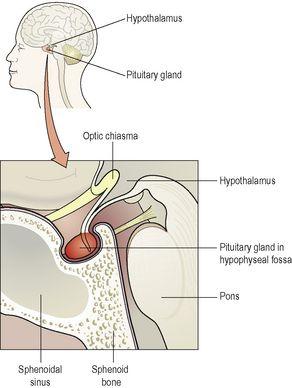Ross & Wilson Anatomy and Physiology in Health and Illness (95 page)
Read Ross & Wilson Anatomy and Physiology in Health and Illness Online
Authors: Anne Waugh,Allison Grant
Tags: #Medical, #Nursing, #General, #Anatomy

Figure 9.1
Positions of the endocrine glands.
Homeostasis of the internal environment is maintained partly by the autonomic nervous system and partly by the endocrine system. The autonomic nervous system is concerned with rapid changes, while endocrine control is mainly involved in slower and more precise adjustments.
Although the hypothalamus is classified as a part of the brain rather than an endocrine gland, it controls the pituitary gland and has an indirect effect on many others.
The ovaries and the testes secrete hormones associated with the reproductive system after puberty. Their functions are described in
Chapter 18
. The placenta that develops to nourish the developing fetus during pregnancy also has an endocrine function, which is outlined in
Chapter 5
. The endocrine glands are explored in the early sections of the chapter. In addition there are also other hormones that do not travel to remote target organs but act locally; these are considered briefly on
page 219
. Problems that arise when abnormalities occur are usually caused by the over- or under-activity of endocrine glands and are explained in the final sections of the chapter.
Overview of hormone action
When a hormone arrives at its target cell, it binds to a specific
receptor
, where it acts as a switch influencing chemical or metabolic reactions inside the cell. The receptors for peptide hormones are situated on the cell membrane and those for lipid-based hormones are inside the cell. Examples are shown in
Box 9.1
.
Box 9.1
Examples of lipid-based and peptide hormones
| Lipid-based hormones | Peptide hormones |
| Steroids e.g. glucocorticoids, mineralocorticoids | Adrenaline (epinephrine), noradrenaline (norepinephrine) |
| Thyroid hormones | Insulin |
| | Glucagon |
The level of a hormone in the blood is variable and self-regulating within its normal range. A hormone is released in response to a specific stimulus and usually its action reverses or negates the stimulus through a
negative feedback mechanism
(see
p. 6
). This may be controlled either indirectly through the release of hormones by the hypothalamus and the anterior pituitary gland, e.g. steroid and thyroid hormones, or directly by blood levels of the stimulus, e.g. insulin and glucagon.
The effect of a
positive feedback mechanism
is amplification of the stimulus and increasing release of the hormone until a particular process is complete and the stimulus ceases, e.g. release of oxytocin during labour (
p. 7
).
Pituitary gland and hypothalamus
Learning outcomes
After studying this section you should be able to:
describe the structure of the hypothalamus and the pituitary gland
explain the influence of the hypothalamus on the lobes of the pituitary gland
outline the actions of the hormones secreted by the anterior and posterior lobes of the pituitary gland.
The pituitary gland and the hypothalamus act as a unit, regulating the activity of most of the other endocrine glands. The pituitary gland lies in the hypophyseal fossa of the sphenoid bone below the hypothalamus, to which it is attached by a
stalk
(
Fig. 9.2
). It is the size of a pea, weighs about 500 mg and consists of three distinct parts that originate from different types of cells. The
anterior pituitary
(adenohypophysis) is an upgrowth of glandular epithelium from the pharynx and the
posterior pituitary
(neurohypophysis) is a downgrowth of nervous tissue from the brain. There is a network of nerve fibres between the hypothalamus and the posterior pituitary. Between these lobes is a thin strip of tissue called the
intermediate lobe
and its function in humans is not known.



